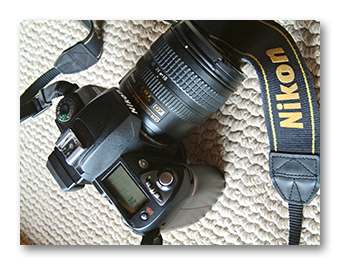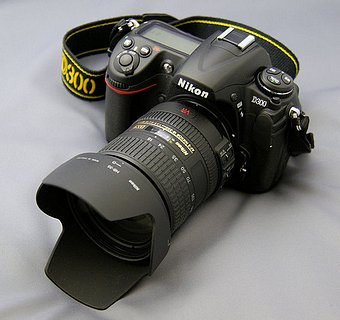previous page
The Gear
The camera….. I think it is fair to say that to get good quality lightning shots requires an SLR camera with
 full manual control. Be it digital or film, the SLR offers many advantages ranging from a huge choice of lenses, fast operation, easy night time composition with “real” viewfinders and a true bulb setting. I began with DSLR using the exceptional Nikon D70 that performs extremely well, is robust while still quite portable. In early 2008 I updated to the D300. This has been a SUPERB camera and I rate it extremely highly for the passionate stormchaser. It has a water resistant body and extremely robust in all types of weather conditions. If the D300 has a downside it is that it uses a tethered remote control. This can be paired with a wireless trigger to allow remote use, but waking up in the middle of the night and fumbling with plugging in the tethered portion of the remote can be, well, shall we say “challenging”. When the action is on the go, every second counts! There are newer higher mp cameras with new sensors about these days. But as it stands when writing this (late 2013) none of them I would consider an upgrade. In terms of sensor tech, sure, but in terms of body build and most importantly handling, all thus far, are not up to scratch in that department. Keep an eye on this space though, never know what the future holds….. 😉
full manual control. Be it digital or film, the SLR offers many advantages ranging from a huge choice of lenses, fast operation, easy night time composition with “real” viewfinders and a true bulb setting. I began with DSLR using the exceptional Nikon D70 that performs extremely well, is robust while still quite portable. In early 2008 I updated to the D300. This has been a SUPERB camera and I rate it extremely highly for the passionate stormchaser. It has a water resistant body and extremely robust in all types of weather conditions. If the D300 has a downside it is that it uses a tethered remote control. This can be paired with a wireless trigger to allow remote use, but waking up in the middle of the night and fumbling with plugging in the tethered portion of the remote can be, well, shall we say “challenging”. When the action is on the go, every second counts! There are newer higher mp cameras with new sensors about these days. But as it stands when writing this (late 2013) none of them I would consider an upgrade. In terms of sensor tech, sure, but in terms of body build and most importantly handling, all thus far, are not up to scratch in that department. Keep an eye on this space though, never know what the future holds….. 😉
The lens… This could be discussed for a very long time and with no 2 people agreeing with the each other. So I will just tell you what I use and why. For 99% of my shots I use the nikon 18-200. It is neither the fastest nor the best lens for edge to edge sharpness. For me what it offers is a massive focal length coverage in an instant. When its on its on and every second counts as every second could be the shot of a lifetime and every second spent fiddling with lens changes could be the one that is missed. But if that doesn’t matter and you live anywhere else BUT the southern parts of South Australia where storms are like hens teeth for us and time is at a premium, then get yourself the fastest and sharpest lens across the frame you can afford. Some people use primes, and while their optical quality cannot be denied, their focal length inflexibility is (in my opinion) a serious inhibitor. Again a few will disagree and this is fine. Each to their own 🙂
One downside of the 18-200 is that, unlike the camera body, its not water resistant. It does seem pretty good having fair drowned the lens once or twice!

The Tripod……. Also essential is a good sturdy tripod. I can’t stress enough the importance of this item. It keeps the camera steady under all conditions. Speed of operation is also important and for this reason I have a quick release head and pistol grip tripod. The tripod is integral in achieving sharp shots.
 You will also need a cable release or (if your camera supports it) an IR remote to trigger the shutter and hold it open for longer than the (usual) camera limit of 30 seconds available under the built in program modes. There are pros and cons to both but I used a small infra red remote control with the D70 and a tethered/IR optioned remote on the D300 (I use the excellent photix remote as pictured to the left). A remote release amongst other things also reduces camera vibration to a minimum allowing sharper captures of your foreground. As to which type of remote to use, there is no right or wrong, just personal preference.
You will also need a cable release or (if your camera supports it) an IR remote to trigger the shutter and hold it open for longer than the (usual) camera limit of 30 seconds available under the built in program modes. There are pros and cons to both but I used a small infra red remote control with the D70 and a tethered/IR optioned remote on the D300 (I use the excellent photix remote as pictured to the left). A remote release amongst other things also reduces camera vibration to a minimum allowing sharper captures of your foreground. As to which type of remote to use, there is no right or wrong, just personal preference.
A (once) hotly debated topic is whether to use film or digital. Some will argue that film is better and vice versa. There are advantages to either system. Personally I shoot digital for the convenience of speed of image retrieval, cost (try rattling off 200 images a night on film without mortgaging a kidney!) and full control over the final printed product.
Footnote – The D300 which replaced my D70 is the closest to film for detail, colour and dynamic range of any digital I have used. (and now there are better again camera bodies) For me personally film is now well and truly dead and while I still hold my old film SLR with reverence its shutter is no longer in use. You mileage and opinion may vary and this is fine. Its all about the image, not the equipment (nor the brand of camera).
move on to next page….

